Jana Pareigis having arrived in New York from Berlin the day before, discussed with me her film Afro. Deutschland (Afro Germany – Being Black and German), co-directed with Susanne Lenz-Gleißner and Adama Ulrich, the influence of Audre Lorde and James Baldwin (Jana wrote the foreword for the German publication of The Fire Next Time), and her own childhood memories growing up in Hamburg, Germany.
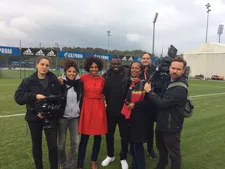 |
| Jana Pareigis with former German National soccer player Gerald Asamoah and her Afro. Deutschland team |
The documentary features on-camera interviews by Jana Pareigis with Theodor Michael (who had an uncredited role in Josef von Báky’s Münchhausen), Samy Deluxe (recording artist and music producer), Robin Rhode (visual artist), Gerald Asamoah (former German National soccer player), Joshua Kwesi Aikins (activist and scholar), Grada Kilomba (Plantation Memories playwright and artist), Esther Donkor (founder of the online magazine krauselocke), Tahir Della (spokesman for the ISD, Initiative Schwarze Menschen in Deutschland), Indira Paasch (dog trainer), Issa Barra (construction worker), and Baaba Yankah-Oduah (hair stylist and owner of Zeebra Tropicana hair salon) sharing their personal stories on what it means to be Black in Germany.
Jana Pareigis, by invitation of the Africana, Puerto Rican and Latino Studies, Women and Gender Studies, and German Departments at Hunter College will present at the Roosevelt House Public Policy Institute a screening of Afro. Deutschland (Afro Germany – Being Black and German), co-directed with Susanne Lenz-Gleißner and Adama Ulrich, on Thursday, May 5 at 5:30pm, followed by a Q&A and reception. The event is free and open to the public with RSVP. The organizers are grateful to Hunter College President Jennifer Raab, Dean John Rose, Dean Andrew Polsky, and the Max Kade Foundation for their generous support.
Jana Pareigis has been the anchor of the daily newscast Heute on German Public Television (ZDF) since 2021 and is the first Black woman news anchor on German television. In the documentary we see her interviewing people from different walks of life. Beginning with the myth of what Germans look like, the film then braids in German Nursery rhymes and children’s cruelty, laments a “shortage of dark-skinned superheroes,” explores the comforts of hip-hop, travels back in time to Germany’s colonial history, still seen in street names and frescoes in Berlin, and returns into a present where attacks on refugees continue to occur.
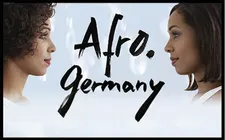 |
| Afro. Deutschland |
From Roosevelt House in New York, Jana Pareigis joined me on Zoom for an in-depth conversation on Afro. Deutschland, Audre Lorde, and James Baldwin.
Anne-Katrin Titze: Hi Jana! You’ve just arrived?
Jana Pareigis: Yes, I just got here at the Roosevelt House.
AKT: How is it staying there?
JP: It’s great, wow! It really has this historical feel. I feel very humbled.
AKT: It feels as if Eleanor were just coming around the corner, doesn’t it?
JP: Yes!
AKT: I very much liked how you structured Afro. Deutschland and how the interviews flow from one to the next. Can you tell me a bit about the great group of people you interviewed?
JP: Sure. Thank you so much first of all. They are all people I either knew before or I had a relation to because of the things they experienced or issues that were close to my heart. For example, I met Theodor Wonja Michael before, the older man who passed away a few years ago unfortunately. For me it was important to have him in the documentary because he’s obviously an older generation so he had to face much more trials and tribulations. It was much harder for him to grow up as a Black person.
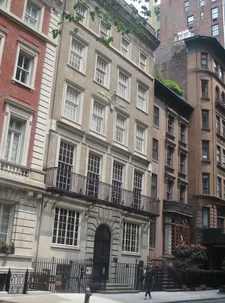 |
| Afro. Deutschland (Afro Germany – Being Black And German) to screen at the Roosevelt House Public Policy Institute Photo: Anne-Katrin Titze |
AKT: His interview is great; he is fantastic. When he talks about being in Josef von Báky’s Münchhausen film in 1943 with Hans Albers you show a clip of his closeup and then he says this line: “Everyone who was Black was in this film.” And it dawns on us while he speaks that the Nazis could have taken them all away at the same time. It’s an incredible moment.
JP: It really moved me as well - just imagining it. There’s a line where he says you cannot hide during National Socialism with a Black face, right? Like, when you’re Jewish you can kind of try to hide because no one can tell from the way you look, right? You can hide your religion, which was obviously very hard as well. I’m just saying that as a Black person you cannot hide. He talks about how he started to stutter because he kind of wanted to disappear. And the pressure was so hard. And then also being in the Völkerschauen, like an exhibition in a zoo.
AKT: With humans!
JP: It’s just unbelievable. That was really important to me because of course we still face racism, but it is a different racism now than it was during National Socialism, of course, or before. It was important to have an older generation and also to capture their stories and their voices. When I did the interview he was maybe 90 years old and I think it’s important to have those interviews for the next generation and tell them what they experienced.
AKT: It’s very important to hear.
JP: Then there were other people, for example Samy Deluxe, whom I kind of knew when I was younger going out. And how that changed for me, being in my youth and meeting more Black people basically. I mean, I grew up in Hamburg, which is a big city in Germany, roughly two million people live there but still in the area where I lived, in the neighbourhood where the university was, it was an open and very nice neighbourhood, but there weren’t really a lot of Black people.
I remember this feeling so vividly, being kind of the only one on the playground, in school, walking around. And then just this whole kind of music, hip hop music, going out, meeting a lot of other Black people, It’s crucial to feel that you’re not alone. Also what was interesting was this whole thing of Black stereotypes.
 |
| Audre Lorde speaks at the first London International Feminist Book Fair in 1984 Photo: Dagmar Schultz |
AKT: There is a feel of chronological order at the beginning of your film. You start with childhood and those scary German childhood games such as “Wer hat Angst vorm schwarzen Mann?” Max and Moritz and on and on, there is so much to take another look at. And then the film moves on to adolescence and new discoveries.
JP: Yeah, it was important to me because I don’t want it to be only a documentary about racism. I also wanted it to be about empowerment and telling people, see, these are some things I experienced or people that I met experienced. And this is how we dealt with it. I think you need some hope at the end of the tunnel. It’s important to share stories, to know that you’re not alone, that there’s help. For example, when you’re attacked, like Issa Barra is, the refugee [from Burkina Faso].
AKT: While going shopping at a supermarket!
JP: At a supermarket, exactly! And he obviously has different experiences from me because I have a German passport. That is totally different. I know my rights and I don’t have to face the things he is facing as someone who is always afraid that he might have to leave the country, who’s not fluent yet with the German language and stuff like that. And also someone who is darker than me, right? There’s a difference, I’m mixed and we know there’s colourism. With the movie I wanted to show some examples and kind of the spectrum.
AKT: As you say, it’s about bringing down barriers and looking at different stories. This morning I just finished teaching my course on German Fairy Tales at Hunter.
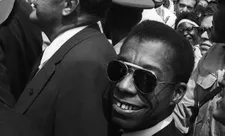 |
| James Baldwin in Raoul Peck’s Oscar-nominated I Am Not Your Negro |
JP: Oh! Ah!
AKT: And my students’ families are from all over the globe. Each one of them is presenting a tale from their cultural heritage and I bring to them the Brothers Grimm and we look at the differences and similarities. Let me ask you the question I start out with with them - did you have a favorite fairy tale growing up?
JP: Oh my god, I have to think about this. I know that right now I’m trying to teach my son - he is three and a half years old - the fairy tale about, we say “die Zahnfee.”
AKT: The tooth fairy!
JP: Yes, the tooth fairy and also the Schnullerfee - the pacifier fairy.
AKT: Ah, I haven’t met her yet.
JP: I’m making up all those fairies. “Do put your pacifier someplace and then the fairy takes it away and you get a present.” But he doesn’t want a present, he still wants the pacifier.
AKT: Another part of your documentary that is fascinating is about the street renaming initiatives [of Mohrenstraße, Afrikanische Straße, etc.] in Berlin and the walk you take [with Joshua Kwesi Aikins]. And to have a good hard look at German colonial history. Do you have updates on the renamings?
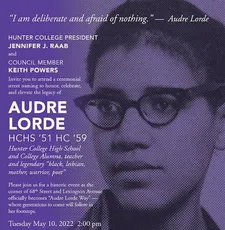 |
| On May 10, 2022 East 68th Street and Lexington Avenue will now be also known as Audre Lorde Way |
JP: Yes. It’s very interesting. The movie, obviously I filmed it in 2016 and the beginning of 2017. It’s been five years and I think it’s still relevant but of course things have changed. We had the Black Lives Matter movement and some of the streets have been renamed, like Mohrenstraße, will be renamed. There are some others that have been or will be renamed. They had to push for a long time, the activists, to get it done, but things are changing. I think the discussion on racism and race - you know in Germany we don’t use the word “race.” It’s different from the US because of the history of National Socialism we don’t use the term. The discussion on racism and race, as you would call it in the US, has been accelerated in the last couple of years to be more in the forefront.
AKT: Apropos renaming, did you hear that next week the block where Hunter College is, Lexington and 68th Street, will be named Audre Lorde Way?
JP: No way! I didn’t know! Really?
AKT: Yes, next week is the ceremony. You’re going to just miss it.
JP: Oh I wish I could be here! How come?
AKT: Well, she could be called one of the patron saints of Hunter. She studied there, she taught there. How did you first encounter Audre Lorde, do you remember?
JP: I do remember, I think I was 13 or 14 years old and I heard about her and how crucial she was for the Afro German movement. It says a lot that an African American woman inspired so much in Germany for Black people. I think we have been inspired a lot by what’s been going on here when it comes to fighting racism in Germany. For example, you’re far more ahead here when it comes to African American studies, studies on racism. It’s still like, kind of, people are working on it, but it hasn’t really been established in a lot of universities yet. I remember hearing about her and reading her work and that’s maybe why I started [in the film] with being a child. It just helped me so much dealing with racism and knowing it’s not an individual problem.
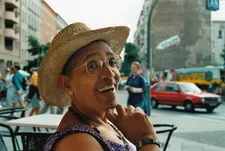 |
| Audre Lorde at the Winterfeldt Markt in Berlin (1992) Photo: Dagmar Schultz |
AKT: It’s systemic. It’s not you. As children we tend to think, and sometimes as adults, too, that we are the problem somehow.
JP: Exactly. I’m sticking out. I haven’t done anything, so what’s going on? I read a lot about her and May Ayim which I mention in the documentary as well. And I read a lot of books on African American history and politics because you have more of a sense of community here in the US when it comes to African Americans than we have in Germany when it comes to Black people. I’m not saying that all African Americans have the same experiences and history but because of being enslaved, it’s more like an African American culture grown over hundreds of years.
In Germany our experiences are so diverse. Black people have been living in Germany for 400 years, sure, others have just emigrated, some have families with a white partner and they have mixed children. They come from all different countries, so it’s a different kind of community. You don’t have Afro German traditions in that sense or a certain kind of language. I think it’s interesting and I know a lot of Afro Germans go to the US in-between because we take so much out of it. Just feeling part of a Black diaspora.
AKT: And then you have someone who did the opposite, James Baldwin, who went to Paris and decided to leave Harlem behind. You wrote the foreword to the German translation of The Fire Next Time. What does James Baldwin mean for you?
 |
| Hunter College at East 68th Street and Lexington Avenue Photo: Anne-Katrin Titze |
JP: It’s interesting what you said, right? That for African Americans it was easier to live in Europe back then, than living here. And for us we like to come here - not that the racism here is not bad, it might be even worse - but we can take so much from the African American experience. I don’t know when I first started reading James Baldwin, maybe in my early twenties also. And I was hooked immediately because he’s so on point. He’s just so sharp in his analysis and also so poetic. That was something that meant a lot to me.
And then the publisher just approached me because I had just done Afro. Germany and they knew I was very vocal as a journalist about racism. So they approached me asking me and I was like, oh my god this is like a godsend. Because James Baldwin means so much to me and in the foreword, I guess you read it, I also start with being in New York, studying at Hunter at that time and going through Harlem and being like, oh my god, all these books! From Black authors that I can’t find in Germany!
AKT: One thread that guides us through the entire film is the subject of hair.
JP: Yeah!
AKT: You start with hair, you go to the hair salon at some point [to discuss the natural hair movement], hair returns in the artworks of South African artist Robin Rhode who sprays a hair painting right in front of you in the film. What’s the latest update on hair for you?
JP: Right now I just did it straight, but I’ll probably have it curly tomorrow - I always change. But it’s true, hair is so politicized, Black hair. I experience it personally as well. I think you always should have the choice. But we know it’s not always easy as a Black person because hair represents so much, like we say in the documentary, in certain jobs they look at you funny if you wear your afro, right? They don’t see it as professional. If you have it straight you are approached differently. That’s why I kind of play with this whole theme. But even before the documentary I always changed, like weekly, and I always had it curly before as well.
AKT: Choice is the word! Thank you so much!
JP: Thank you so much!
Roosevelt House Public Policy Institute at Hunter College is at 47-49 East 65th Street.






















